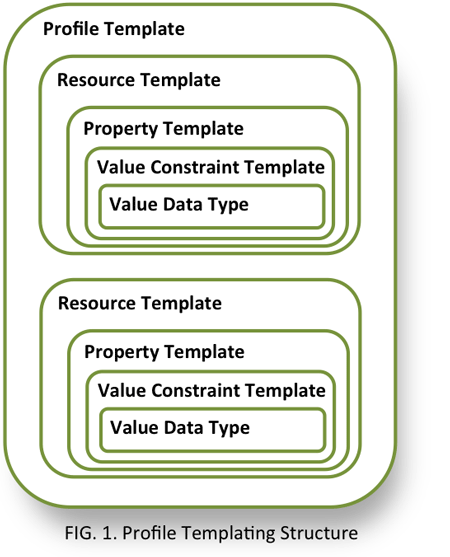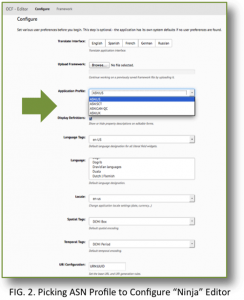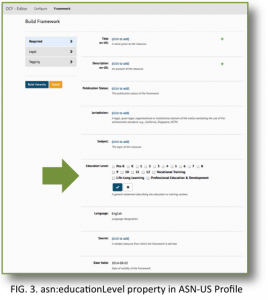Introduction and Specification of ASN “Profiles”—Briefing #3
- URL:
- https://ld4pe.dublincore.org/asn-briefing-3/
- Editors:
- Joseph Chapmann (Desire2Learn)
- Stuart A. Sutton (Information School, University of Washington)
- Last Update:
- 2015-07-01
Licensed under a Creative Commons Attribution 4.0 International License.
Abstract
The ASN profiling language provides communities and organizations with the means to define profiles of the ASN to meet particular needs through inclusion of additional properties and classes from other namespaces and definition of constraints on data patterns. ASN profiling is based on the Dublin Core’s conceptualization of application profiles and description set templating as well as refinements to these conceptualizations developed by the U.S. Library of Congress to support BIBFRAME profiling.
Table of Contents
- 1. Introduction
- 2. Basic Structure
- 3. Detailed Application Profile Description Grammar
- 4. Use of Contextual Classes
- 5. Example Editor Configured for the ASN-D2L Profile
- Appendix A: ASN-DL Profile Element Tables & Examples
- ASN Profile Specifications
1. Introduction
The ASN Description Language (ASN-DL) is a graph-based metamodel for creation of 1-n ASN profiles for the description of competency frameworks defined by national, regional and organizational bodies (jurisdictions). The ASN-DL assumes that no single, tightly defined schema for describing competency frameworks will meet all needs. Instead, the ASN-DL provides the means to “profile” the ASN through extension, refinement and augmentation to meet particular needs. It is through such profiling of the ASN that different jurisdictions and entities define their own solutions while maintaining the ability for their metadata to be harmonized across profiles. ASN Profiles also provide the means for local constraints on acceptable data (i.e., defining data “rules” on specific RDF graphs) to be communicated to others. To achieve these goals, the ASN-DL provides a small vocabulary of classes and properties and a set of mechanisms for tailoring an ASN Profile to handle particular jurisdictional, organizational or application needs.
A “profile” in the sense meant here is a means of instantiating “closed world assumptions” in a given context. In similar vein, the ASN DL defines a vocabulary and encourages multiple other (unrelated) entities to create and maintain extension and refinement sets of constraints on the ASN vocabulary without violating it.
This ASN Briefing will illustrate development of new ASN profiles using the mechanisms provided by the ASN-DL. Examples are provided using the United States Profile (ASN-D2L) as set out in full in Appendix B and the Australian Profile (ASN-AU) set out in full in Appendix C.
For a general introduction to the ASN-DL, it’s uses, properties and classes, see Briefing Paper #1 – Introduction and Briefing Paper #2 – ASN Ontology.
2. Basic Structure
A jurisdiction’s ASN Profile is an information model for describing competency frameworks that is based in the ASN-DL and particularized for the jurisdiction through the processes of:
- refinement (definition of subclasses and subproperties of existing ASN classes and properties);
- extension (use of properties and classes either newly created for use with the specific ASN Profile or reused from other ontologies); and
- value constraints (restricting the permissible value datatypes or classes).
The result of these processes of refinement, extension and value constrain definition is a declarative specification of the particular “RDF data shape” required for a jurisdiction’s RDF data to be deemed “conforming”. The resulting “shape” provides implementers with both a means of unambiguously communicating about the Profile and developing mechanisms for validation of data conforming to it. By being declarative and stating the validation intent rather than the validation method, an ASN Profile description is useful in many different implementation scenarios including development of data validation mechanisms using deployed solutions such as Stardog ICV, IBM’s Resource Shapes, TopQuadrant’s SPIN (a W3C Member Submission), and SPARQL.
An ASN Profile document has two fundamental parts: (1) a set of template-defining tables based in the ASN Profile Grammar (see section 3 below) that describe the Profile’s permissible resource classes, the object and datatype properties associated with those classes, and the constrains on permissible property values (i.e., value vocabularies and datatypes); and (2) a JSON serialization of the resulting constraints defined in the tables.
FIG 1. below illustrates the basic templating structure of an ASN Profile document:
- a profile template for describing the Profile itself;
- resource templates describing the resource classes making up the Profile;
- an array of property templates defined for each resource class that are used to describe the possible metadata structure of a “record” conforming to the Profile; and
- value constraint templates defining constraints to be applied to properties that restrict the permitted values associated with the property templates.
3. Detailed Application Profile Description Grammar
The following Extended Backus-Nuar Form describes the syntax used in Appendix A to describe the essential ASN Profile syntax elements for defining the templates. The ASN grammar extends the BIBFRAME grammar defined in BIBFRAME Profiles: Introduction and Specification through addition of the allowedValueURI value constraint to support specification of “pick lists” of resource classes.
Profile ::= id | title | description | date | contact | remark | resourceTemplates*
resourceTemplates ::= id | resourceURI | resourceLabel | remark | propertyTemplates*
propertyTemplates::= propertyURI | propertyLabel | mandatory | repeatable? | type |
valueConstraint | remark
valueConstraint ::= valueLanguage | languageURI | languageLabel| valueDataType | valueTemplateRefs |
allowedValueURI | editable | defaultURI | remark
valueDataType ::= dataTypeURI | dataTypeLabel | dataTypeLabelHint | remark
valueTemplateRefs ::= editable | defaultURI | defaultLabel
mandatory ::= "true" | "false"
repeatable ::= "true" | "false"
editable ::= "true" | "false"
id ::= URI
resourceURI ::= URI
propertyURI ::= URI
languageURI ::= URI
dataTypeURI ::= URI
valueTemplateRefs ::= URI
allowedValueURI ::= URI
defaultURI ::= URI
type ::= literal | resource
literal ::= valueLanguage | languageURI | languageLabel | valueDataType
resource ::= valueTemplateRefs | editable | defaultURI
4. Use of Contextual Classes
Many jurisdictions and other entities that create competency frameworks have existing authority files, controlled vocabularies, taxonomies and thesauri defining acceptable values for concepts such as education levels and subjects. These vocabularies provide significant jurisdiction-specific context to the Profile; and, therefore, they should be used to constrain data values. Such authority files and controlled vocabularies may be currently expressed as simple text terms or be modeled as contextual classes using a description language like W3C’s Simple Knowledge Organization System (SKOS). We strong recommend that consideration be given to modeling a Profile’s key vocabularies as skos:ConceptScheme classes with individual concepts of the class skos:Concept.
When controlled vocabularies and authority files are modeled as a skos:ConceptScheme with concepts defined as skos:Concept, instead of expressing a U.S. education level as being “Grade 5”, the value can be identified as a member of a concept class using the U.S. URI <http://purl.org/ASN/scheme/ASNEducationLevel/5> from the ASN-D2L Education Level Vocabulary. Similarly, the subject concept of “Statistics & probability” could be more usefully named as <http://vocabulary.curriculum.edu.au/scot/2570> from the Australian Schools Online Thesaurus (ScOT) . Expressing these various concept terms as members of formal classes makes it possible to use them as Linked Data “glue” and guarantees uniformity of use and machine readability that is lacking with terms encoded as plain literals.
Therefore, every effort should be made in developing an ASN Profile to convert “strings” to “things”—i.e., from literals to linkable resources identified by resolvable URI.
5. Example Editor Configured for the ASN-D2L Profile
The ASN profiling language and it’s precise grammar facilitate the description and enabling of form-based editors. The following images are of the ASN-DL editor under development through a U.S. Institute for Library & Museum Studies (IMLS) grant to the Information School at the University of Washington. The editor is implemented in Angular-JS and supports the core ASN model and profiles–currently the U.S. and the Australian profiles.
Appendix A:
ASN-DL Profile Element Tables & Examples
Profile Template
Identifier
| Name | id |
| Summary | Unique identifier for the profile |
| Value | Text |
Title
| Name | title |
| Summary | Textual title associated with the profile |
| Value | Text |
Description
| Name | description |
| Summary | Textual description associated with the profile |
| Value | Text |
Date
| Name | date |
| Summary | Date associated with the profile |
| Value | Text |
Contact
| Name | contact |
| Summary | Contact information associated with the profile |
| Value | Text |
Remark
| Name | remark |
| Summary | Comment or guiding statement intended to be presented as supplementary information in user display |
| Value | Text |
Resource Templates
| Name | resourceTemplates |
| Summary | An array representing one or more Resource Templates (see section 2.3. below) |
| Value | Array |
Example A: Profile Description
{
"Profile": {
"id": "asnUS:Profile",
"title": "ASN Profile: U.S. Competency Framework Schema",
"description": "An ASN profile for competency framework description
reflecting the descriptions in the ASN-D2L database",
"date": "2005-01-01",
"contact": "Joseph Chapman, Desire2Learn; Stuart Sutton, University
of Washington",
"remark": "Partially developed through NSF funding."
"resourceTemplates": [
{ ... }
]
}
}
Resource Template
Identifier
| Name | id |
| Summary | Identifier associated with the resource template. |
| Value | text |
| Default | None |
Resource Identifier
| Name | resourceIdentifier |
| Summary | URI of the RDF resource associated with the resource template. |
| Value | URI |
| Default | None |
Resource Label
| Name | resourceLabel |
| Summary | Localized label associated with the resource. |
| Value | Text |
| Default | None |
Property Templates
| Name | propertyTemplates |
| Summary | An array representing one or more Property Templates (see section 2.4. below). |
| Value | Array |
Contact
| Name | contact |
| Summary | Contact information associated with the profile. |
| Value | Text |
Remark
| Name | remark |
| Summary | Comment or guiding statement intended to be presented as supplementary information in user display. A common use for this is to notify a user of code lists or schemata associated with the expected value of this resource. |
| Value | Text |
Example B: Resource Template
...
"resourceTemplate": [
{
"id": "asnUS:StandardDocument",
"resourceLabel": "Standard Document",
"resourceURI": "http://purl.org/ASN/schema/core/StandardDocument",
"propertyTemplates": [
{ ... }
]
}
...
Example C: Resource Template
...
"resourceTemplate": [
{
"id": "asnUS:Statement",
"resourceLabel": "Statement",
"resourceURI": "http://purl.org/ASN/schema/core/Statement",
"propertyTemplates": [
{ ... }
]
}
...
Property Template
Identifier
| Name | propertyURI |
| Summary | URI of the RDF property being described. |
| Value | URI |
| Default | None |
Property Label
| Name | propertyLabel |
| Summary | Preferred, human readable label associated with this property. |
| Value | Text |
| Default | None |
Mandatory
| Name | mandatory |
| Summary | Indication that the property is mandatory. |
| Value | “true” or “false” |
| Default | false |
Repeatable
| Name | repeatable |
| Summary | Indication that the property is repeatable. |
| Value | “true” or “false” |
| Default | true |
Type
| Name | type |
| Summary | Type or value (literal / resource) that is allowed by this property. |
| Value | Text or URI |
| Default | literal |
Value Constrant
| Name | valueConstraint |
| Summary | Constraint associated with the value (see section 2.5 and section 2.6 below). |
| Value | Sub-description |
Remark
| Name | remark |
| Summary | Comment or guiding statement intended to be presented as supplementary information in user display. |
| Value | Text |
Example D: Property Template (mandatory / literal)
...
"propertyTemplate": [
{ ... },
{
"propertyURI": "http://purl.org/dc/elements/1.1/title",
"propertyLabel": "Title",
"mandatory": "true",
"type": "literal"
},
{ ... }
]
...
Example E: Property Template (optional / resource)
...
"propertyTemplate": [
{ ... },
{
"propertyURI": "http://purl.org/gem/qualifiers/hasChild",
"propertyLabel": "Has Child",
"type": "resource",
"valueConstraint": {
...
}
},
{ ... }
]
...
Value Constraint
Language
| Name | valueLanguage |
| Summary | Language specified for a literal. |
| Value | Text |
| Default | None |
Language URI
| Name | languageURI |
| Summary | URI associated with the language of the literal. |
| Value | URI |
| Default | None |
Language Label
| Name | languageLabel |
| Summary | Preferred, human readable label associated with the language of the literal. |
| Value | Sub-description |
| Default | None |
Datatype
| Name | valueDataType |
| Summary | Description specifying a datatype for a literal. |
| Value | Sub-description |
| Default | None |
Value Template Reference(s)
| Name | valueTemplateRefs |
| Summary | An array of one or more resource template identifiers (see section 2.3 above) of the resource templates that define the expected value. |
| Value | URI |
| Default | None |
Use Values From
| Name | useValuesFrom |
| Summary | An array of identifiers that identify value lists from which acceptable values should come. Scheme URIs are expected, but differing communities may develop differing solutions. |
| Value | URI |
| Default | None |
allowedValueURI
| Name | allowedValueURI |
| Summary | An array of identifiers from which an acceptable value should be selected. |
| Value | URI |
| Default | None |
Editable
| Name | editable |
| Summary | Whether the value provided for the property is meant to be modified by a cataloguer. If not, the specified default value is in effect fixed. |
| Value | URI |
| Default | None |
Remark
| Name | remark |
| Summary | Comment or guiding statement intended to be presented as supplementary information in user display. |
| Value | Text |
Example F: Value Constrain referencing the Value URI of another Resource Template in the Profile
...
"propertyTemplates": [
{ ... },
{
"propertyURI": "http://purl.org/dc/terms/isPartOf",
"propertyLabel": "Is Part Of",
"type": "resource",
"valueConstraint": {
"valueTemplateRefs": [
"asnUS:StandardDocument"
]
}
},
{ ... }
]
...
Example G: Value Constrain referencing an enumerated list of acceptable value URI
...
"propertyTemplates": [
{ ... },
{
"propertyURI": "http://purl.org/dc/terms/license",
"propertyLabel": "License",
"type": "resource",
"valueConstraint": {
"repeatable": "false",
"mandatory": "true",
"allowedValueURI": [
"http://creativecommons.org/licenses/by/4.0/",
"http://creativecommons.org/licenses/by-nc/4.0/",
"http://creativecommons.org/licenses/by-nd/4.0/",
"http://creativecommons.org/licenses/by-nc-nd/4.0/",
"http://creativecommons.org/licenses/by-sa/4.0/",
"http://creativecommons.org/licenses/by-nc-sa/4.0/",
"http://creativecommons.org/publicdomain/zero/1.0/"
]
}
},
{ ... }
]
...
Example H: Value Constrain referencing one or more value set(s) (controlled vocabularies and authority file classes)from which values must be taken
...
"propertyTemplates": [
{ ... },
{
"propertyURI": "http://purl.org/ASN/schema/core/publicationStatus",
"propertyLabel": "Publication Status",
"type": "resource",
"valueConstraint": {
"repeatable": "false",
"mandatory": "true",
"usesValuesFrom": [
"http://purl.org/ASN/scheme/ASNPublicationStatus/",
]
}
},
{ ... }
]
...
Value Data Type
DataType ID
| Name | dataTypeURI |
| Summary | URI associated with the DataType |
| Value | URI |
| Default | None |
DataType Label
| Name | dataTypeLabel |
| Summary | Preferred, human readable label associated with the DataType. |
| Value | Text |
| Default | None |
DataType Label Hint
| Name | dataTypeLabelHint |
| Summary | Short, human readable label primarily for display purposes. |
| Value | Text |
| Default | None |
Remark
| Name | remark |
| Summary | Comment or guiding statement intended to be presented as supplementary information in user display. |
| Value | Text |
Example I: Data Value Type
...
"propertyTemplates": [
{ ... },
{
"propertyURI": "http://purl.org/dc/terms/dateValid",
"propertyLabel": "Date Modified",
"type": "literal",
"valueConstraint": {
"valueDataType": {
"resourceURI": "http://www.w3.org/2001/XMLSchema#date",
"valueLabel": "ISO 8601"
}
}
},
{ ... }
]
...
Appendix B: ASN-D2L Profile Specification
{
"Profile": {
"id": "asnUS:Profile",
"title": "ASN Profile: U.S. Competency Framework Schema",
"description": "An ASN profile for competency framework description as used
by the ASN-D2L database",
"date": "2005-01-01",
"contact": "Joseph Chapman, Desire2Learn; Stuart Sutton, University
of Washington",
"remark": "Partially developed through NSF funding.",
"resourceTemplates": [
{
"id": "asn:StandardDocument",
"resourceLabel": "Standard Document",
"resourceURI": "http://purl.org/ASN/schema/core/StandardDocument",
"propertyTemplates": [
{
"propertyURI": "http://purl.org/ASN/schema/core/alignFrom",
"propertyLabel": "Aligned From",
"repeatable": "true",
"mandatory": "false",
"type": "resource",
"valueConstraint": {
"valueTemplateRefs": [
"asn:StandardDocument"
]
}
},
{
"propertyURI": "http://purl.org/ASN/schema/core/alignTo",
"propertyLabel": "Aligned To",
"repeatable": "true",
"mandatory": "false",
"type": "resource",
"valueConstraint": {
"valueTemplateRefs": [
"asn:StandardDocument"
]
}
},
{
"propertyURI": "http://www.loc.gov/loc.terms/relators/AUT",
"propertyLabel": "Author",
"type": "literal",
"repeatable": "true",
"mandatory": "false"
},
{
"propertyURI": "http://purl.org/dc/terms/dateCopyrighted",
"propertyLabel": "Date Copyrighted",
"type": "literal",
"valueConstraint": {
"valueDataType": {
"resourceURI": "http://www.w3.org/2001/XMLSchema#date",
"valueLabel": "ISO 8601"
}
}
},
{
"propertyURI": "http://purl.org/dc/terms/dateValid",
"propertyLabel": "Date Valid",
"type": "literal",
"valueConstraint": {
"valueDataType": {
"resourceURI": "http://www.w3.org/2001/XMLSchema#date",
"valueLabel": "ISO 8601"
}
}
},
{
"propertyURI": "http://purl.org/dc/term/description",
"propertyLabel": "Description",
"type": "literal",
"repeatable": "true",
"mandatory": "true",
"valueConstraint": {
"valueLanguage": "en"
}
},
{
"propertyURI": "http://purl.org/dc/terms/educationLevel",
"propertyLabel": "Education Level",
"type": "resource",
"valueConstraint": {
"repeatable": "true",
"mandatory": "true",
"usesValuesFrom": [
"http://purl.org/ASN/scheme/ASNEducationLevel/",
]
}
},
{
"propertyURI": "http://purl.org/gem/qualifiers/hasChild",
"propertyLabel": "Has Child",
"repeatable": "true",
"mandatory": "true",
"type": "resource",
"valueConstraint": {
"valueTemplateRefs": [
"asn:Statement"
]
}
},
{
"propertyURI": "http://purl.org/gem/qualifiers/identifier",
"propertyLabel": "Identifier",
"type": "literal",
"repeatable": "true",
"mandatory": "false"
},
{
"propertyURI": "http://purl.org/ASN/schema/core/jurisdiction",
"propertyLabel": "Jurisdiction",
"type": "resource",
"valueConstraint": {
"repeatable": "false",
"mandatory": "true",
"usesValuesFrom": [
"http://purl.org/ASN/scheme/ASNJurisdiction/",
"http://id.loc.gov/vocabulary/countries/",
]
}
},
{
"propertyURI": "http://purl.org/dc/elements/1.1/language",
"propertyLabel": "Language",
"type": "resource",
"valueConstraint": {
"repeatable": "false",
"mandatory": "true",
"usesValuesFrom": [
"http://id.loc.gov/vocabulary/iso639-1/"
],
"defaultURI": "http://id.loc.gov/vocabulary/iso639-1/en"
}
},
{
"propertyURI": "http://purl.org/dc/terms/license",
"propertyLabel": "License",
"type": "resource",
"valueConstraint": {
"repeatable": "false",
"mandatory": "true",
"allowedValueURI": [
"http://creativecommons.org/licenses/by/4.0/",
"http://creativecommons.org/licenses/by-nc/4.0/",
"http://creativecommons.org/licenses/by-nd/4.0/",
"http://creativecommons.org/licenses/by-nc-nd/4.0/",
"http://creativecommons.org/licenses/by-sa/4.0/",
"http://creativecommons.org/licenses/by-nc-sa/4.0/",
"http://creativecommons.org/publicdomain/zero/1.0/"
]
}
},
{
"propertyURI": "http://purl.org/ASN/schema/core/localSubject",
"propertyLabel": "Local Subject",
"type": "literal",
"repeatable": "true",
"mandatory": "false",
"valueConstraint": {
"valueLanguage": "en"
}
},
{
"propertyURI": "http://www.w3.org/2004/02/skos/core#note",
"propertyLabel": "Note",
"type": "literal",
"repeatable": "true",
"mandatory": "false",
"valueConstraint": {
"valueLanguage": "en"
}
},
{
"propertyURI": "http://purl.org/ASN/schema/core/publicationStatus",
"propertyLabel": "Publication Status",
"type": "resource",
"valueConstraint": {
"repeatable": "false",
"mandatory": "true",
"usesValuesFrom": [
"http://purl.org/ASN/scheme/ASNPublicationStatus/",
]
}
},
{
"propertyURI": "http://purl.org/dc/elements/1.1/publisher",
"propertyLabel": "Pubisher",
"type": "literal",
"repeatable": "false",
"mandatory": "false"
},
{
"propertyURI": "http://purl.org/ASN/schema/core/repositoryDate",
"propertyLabel": "Repository Date",
"type": "literal",
"repeatable": "false",
"mandatory": "true",
"valueConstraint": {
"valueDataType": {
"resourceURI": "http://www.w3.org/2001/XMLSchema#date",
"valueLabel": "ISO 8601"
}
}
},
{
"propertyURI": "http://purl.org/dc/terms/rights",
"propertyLabel": "Rights",
"type": "literal",
"repeatable": "true",
"mandatory": "false",
"valueConstraint": {
"valueLanguage": "en"
}
},
{
"propertyURI": "http://purl.org/dc/terms/rightsHolder",
"propertyLabel": "Rights Holder",
"type": "literal",
"repeatable": "false",
"mandatory": "false"
},
{
"propertyURI": "http://purl.org/dc/terms/source",
"propertyLabel": "Source",
"type": "literal",
"repeatable": "false",
"mandatory": "true"
},
{
"propertyURI": "http://purl.org/dc/terms/subject",
"propertyLabel": "Subject",
"type": "resource",
"valueConstraint": {
"repeatable": "false",
"mandatory": "true",
"usesValuesFrom": [
"http://purl.org/ASN/scheme/ASNTopics/",
]
}
},
{
"propertyURI": "http://purl.org/dc/elements/1.1/title",
"propertyLabel": "Title",
"type": "literal",
"repeatable": "true",
"mandatory": "true",
"valueConstraint": {
"valueLanguage": "en"
}
},
]
},
{
"id": "http://purl.org/ASN/schema/core/Statement",
"resourceLabel": "Statement",
"resourceURI": "http://purl.org/ASN/schema/core/Statement",
"propertyTemplates": [
{
"propertyURI": "http://purl.org/ASN/schema/core/alignFrom",
"propertyLabel": "Aligned From",
"repeatable": "true",
"mandatory": "false",
"type": "resource",
"valueConstraint": {
"valueTemplateRefs": [
"asn:Statement"
]
}
},
{
"propertyURI": "http://purl.org/ASN/schema/core/alignto",
"propertyLabel": "Aligned To",
"repeatable": "true",
"mandatory": "false",
"type": "resource",
"valueConstraint": {
"valueTemplateRefs": [
"http://purl.org/ASN/schema/core/Statement"
]
}
},
{
"propertyURI": "http://purl.org/ASN/schema/core/altStatementNotation",
"propertyLabel": "Alternate Statement Notation",
"type": "literal",
"repeatable": "false",
"mandatory": "false"
},
{
"propertyURI": "http://www.loc.gov/loc.terms/relators/AUT",
"propertyLabel": "Author",
"type": "literal",
"repeatable": "true",
"mandatory": "false"
},
{
"propertyURI": "http://purl.org/ASN/schema/core/authorityStatus",
"propertyLabel": "Authority Status",
"type": "resource",
"valueConstraint": {
"repeatable": "false",
"mandatory": "true",
"usesValuesFrom": [
"http://purl.org/ASN/scheme/ASNAuthorityStatus/",
]
}
},
{
"propertyURI": "http://purl.org/ASN/schema/core/broadAlignment",
"propertyLabel": "Broad Alignment",
"repeatable": "true",
"mandatory": "false",
"type": "resource",
"valueConstraint": {
"valueTemplateRefs": [
"http://purl.org/ASN/schema/core/Statement"
]
}
},
{
"propertyURI": "http://purl.org/ASN/schema/core/comment",
"propertyLabel": "Comment",
"type": "literal",
"repeatable": "true",
"mandatory": "false",
"valueConstraint": {
"valueLanguage": "en"
}
},
{
"propertyURI": "http://purl.org/ASN/schema/core/comprisedOf",
"propertyLabel": "Comprised Of",
"repeatable": "true",
"mandatory": "false",
"type": "resource"
},
{
"propertyURI": "http://purl.org/ASN/schema/core/conceptKeyword",
"propertyLabel": "Concept Key Word",
"type": "literal",
"repeatable": "true",
"mandatory": "false",
"valueConstraint": {
"valueLanguage": "en"
}
},
{
"propertyURI": "http://purl.org/ASN/schema/core/conceptTerm",
"propertyLabel": "Concept Term",
"type": "resource",
"valueConstraint": {
"repeatable": "true",
"mandatory": "false",
"usesValuesFrom": [
"http://vocabulary.curriculum.edu.au/scot/",
"http://dbpedia.org/resource/",
"https://www.freebase.com/",
"http://id.loc.gov/authorities/subjects/",
"http://id.loc.gov/authorities/names/",
"http://viaf.org/viaf/",
"http://vocab.getty.edu/tgn/",
"http://vocab.getty.edu/att/",
"http://vocab.getty.edu/ulan/"
]
}
},
{
"propertyURI": "http://purl.org/ASN/schema/core/crossSubjectReference",
"propertyLabel": "Cross-Subject Reference",
"repeatable": "true",
"mandatory": "false",
"type": "resource",
"valueConstraint": {
"valueTemplateRefs": [
"asn:Statement"
]
}
},
{
"propertyURI": "http://purl.org/ASN/schema/core/derivedFrom",
"propertyLabel": "Derived From",
"repeatable": "true",
"mandatory": "false",
"type": "resource",
"valueConstraint": {
"valueTemplateRefs": [
"asn:Statement"
]
}
},
{
"propertyURI": "http://purl.org/dc/term/description",
"propertyLabel": "Description",
"type": "literal",
"repeatable": "true",
"mandatory": "true",
"valueConstraint": {
"valueLanguage": "en"
}
},
{
"propertyURI": "http://purl.org/dc/terms/educationLevel",
"propertyLabel": "Education Level",
"type": "resource",
"valueConstraint": {
"repeatable": "true",
"mandatory": "true",
"usesValuesFrom": [
"http://purl.org/ASN/scheme/ASNEducationLevel/",
]
}
},
{
"propertyURI": "http://purl.org/ASN/schema/core/exactAlignment",
"propertyLabel": "Exact Alignment",
"repeatable": "true",
"mandatory": "false",
"type": "resource",
"valueConstraint": {
"valueTemplateRefs": [
"asn:Statement"
]
}
},
{
"propertyURI": "http://www.w3.org/2004/02/skos/core#exactMatch",
"propertyLabel": "Has Exact Match",
"repeatable": "true",
"mandatory": "false",
"type": "resource",
"valueConstraint": {
"valueTemplateRefs": [
"http://purl.org/ASN/schema/core/Statement"
]
}
},
{
"propertyURI": "http://purl.org/gem/qualifiers/hasChild",
"propertyLabel": "Has Child",
"repeatable": "true",
"mandatory": "false",
"type": "resource",
"valueConstraint": {
"valueTemplateRefs": [
"asn:Statement"
]
}
},
{
"propertyURI": "http://purl.org/ASN/schema/core/indexingStatus",
"propertyLabel": "Indexing Status",
"type": "resource",
"valueConstraint": {
"repeatable": "true",
"mandatory": "true",
"usesValuesFrom": [
"http://purl.org/ASN/scheme/ASNIndexingStatus/",
]
}
},
{
"propertyURI": "http://purl.org/gem/qualifiers/isChildOf",
"propertyLabel": "Is Child Of",
"repeatable": "true",
"mandatory": "false",
"type": "resource",
"valueConstraint": {
"valueTemplateRefs": [
"asn:Statement",
"asn:StandardSocument"
]
}
},
{
"propertyURI": "http://purl.org/gem/qualifiers/isChildOf",
"propertyLabel": "Is Part Of",
"repeatable": "true",
"mandatory": "true",
"type": "resource",
"valueConstraint": {
"valueTemplateRefs": [
"asn:StandardDocument"
]
}
},
{
"propertyURI": "http://purl.org/dc/terms/isVersionOf",
"propertyLabel": "Is Version Of",
"repeatable": "false",
"mandatory": "false",
"type": "resource",
"valueConstraint": {
"valueTemplateRefs": [
"asn:Statement"
]
}
},
{
"propertyURI": "http://purl.org/dc/elements/1.1/language",
"propertyLabel": "Language",
"type": "resource",
"valueConstraint": {
"repeatable": "false",
"mandatory": "true",
"usesValuesFrom": [
"http://id.loc.gov/vocabulary/iso639-1/"
],
"defaultURI": "http://id.loc.gov/vocabulary/iso639-1/en"
}
},
{
"propertyURI": "http://purl.org/ASN/schema/core/listID",
"propertyLabel": "List ID",
"type": "literal",
"repeatable": "true",
"mandatory": "false"
},
{
"propertyURI": "http://purl.org/ASN/schema/core/localSubject",
"propertyLabel": "Local Subject",
"type": "literal",
"repeatable": "true",
"mandatory": "false",
"valueConstraint": {
"valueLanguage": "en"
}
},
{
"propertyURI": "http://purl.org/ASN/schema/core/majorAlignment",
"propertyLabel": "Major Alignment",
"repeatable": "true",
"mandatory": "false",
"type": "resource",
"valueConstraint": {
"valueTemplateRefs": [
"asn:Statement"
]
}
},
{
"propertyURI": "http://purl.org/ASN/schema/core/minorAlignment",
"propertyLabel": "Minor Alignment",
"repeatable": "true",
"mandatory": "false",
"type": "resource",
"valueConstraint": {
"valueTemplateRefs": [
"asn:Statement"
]
}
},
{
"propertyURI": "http://purl.org/ASN/schema/core/narrowAlignment",
"propertyLabel": "Narrow Alignment",
"repeatable": "true",
"mandatory": "false",
"type": "resource",
"valueConstraint": {
"valueTemplateRefs": [
"asn:Statement"
]
}
},
{
"propertyURI": "http://purl.org/ASN/schema/core/skillEmbodied",
"propertyLabel": "Skills Embodied",
"type": "resource",
"valueConstraint": {
"repeatable": "true",
"mandatory": "false",
"usesValuesFrom": [
"http://purl.org/ASN/schema/core/SkillsEmbodied"
]
}
},
{
"propertyURI": "http://purl.org/dc/terms/spatial",
"propertyLabel": "Spatial",
"type": "literal",
"valueConstraint": {
"valueDataType": {
"resourceURI": "http://www.w3.org/2001/XMLSchema#date",
"valueLabel": "ISO 8601"
}
}
},
{
"propertyURI": "http://purl.org/ASN/schema/core/statementLabel",
"propertyLabel": "Statement Label",
"type": "literal",
"repeatable": "true",
"mandatory": "false",
"valueConstraint": {
"valueLanguage": "en"
}
},
{
"propertyURI": "http://purl.org/ASN/schema/core/statementNotation",
"propertyLabel": "Statement Notation",
"type": "literal",
"repeatable": "true",
"mandatory": "false"
},
{
"propertyURI": "http://purl.org/dc/terms/subject",
"propertyLabel": "Subject",
"type": "resource",
"valueConstraint": {
"repeatable": "false",
"mandatory": "true",
"usesValuesFrom": [
"http://purl.org/ASN/scheme/ASNTopics/",
]
}
},
]
}
]
}
}
Appendix C: ASN-AU Profile Specification
TODO NOTE: In this section, provide the complete ASN-AUS profile in JSON.
References
- [1] BIBFRAME Profiles: Introduction and Specification (Draft—5 May 2014)
- http://www.loc.gov/bibframe/docs/bibframe-profiles.html
Revisions
- @@@




